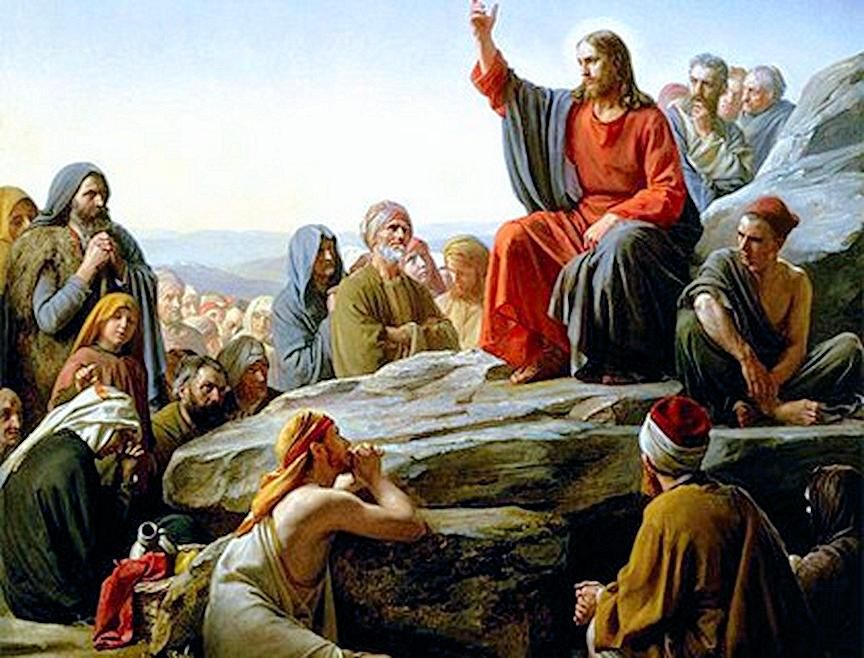 Images of Christ by the 19th-century Danish artist Carl Bloch, considerd by some to have been the 'best' painter of Jesus images in his time.
A typically out-of-the-box reflection by my local pastor, Fr. Rutler, of the Church of our Svaiour in New York City...
Christ the Gentleman
Images of Christ by the 19th-century Danish artist Carl Bloch, considerd by some to have been the 'best' painter of Jesus images in his time.
A typically out-of-the-box reflection by my local pastor, Fr. Rutler, of the Church of our Svaiour in New York City...
Christ the Gentleman
by Rev. George W. Rutler

May 9, 2012
King Charles II said that a gentleman is one who puts those around him at ease. Even on his deathbed he apologized to the courtiers in attendance: “I am sorry, gentlemen, for being such a time a-dying.”
The Society of Friends [Quakers] was a curiosity to him, especially because one of his admirals to whom he owed a large debt, had a son who belonged to it.
When William Penn, as a Quaker, would not doff his hat to the King, he asked, “Friend Charles, why dost thou remove thy hat?” The King answered, “Friend William, in circumstances such as these it is customary for only one man to keep his hat on.” Some accounts attribute the line to the King’s brother the Duke of York, who was only slightly less jolly and bibulous but even more Unquakerly Catholic. We do know that from such happy conversations we got Pennsylvania and New York.
One of the most glowing sections of Newman’s “Lectures on the Idea of a University” is his descant on manners: “Hence it is that it is almost a definition of a gentleman to say that he is one who never inflicts pain.”
But read his lines carefully. The passage is redolent with irony, for the natural gentleman is not of necessity a Christian: “This description is both refined and, as far as it goes, accurate. He is mainly occupied in merely removing the obstacles which hinder the free and unembarrassed action of those about him; and he concurs with their movements rather than takes the initiative himself.”
One risks glibness if not irreverence to say that Christ was a gentleman in the natural sense, but the graciousness of his human nature was “hypostatic” with the Source of Grace, and one sign of this was his habit of putting those around Him at ease.
['Hypostasis' is a word I have encountered twice in the past few hours, and in the theological sense, it means, in the simplest sense, 'the union of divinity and humanity in Christ'].
Julian of Norwich spoke often of this trait refracted in various ways: “Then our courteous Lord sheweth himself to the soul cheerfully with glad countenance, with a friendly welcome.”
 Sermon on the Mount, Carl Bloxh (Denmark, 1834-1890), oil on copper.
Sermon on the Mount, Carl Bloxh (Denmark, 1834-1890), oil on copper.
With protocols from the Heavenly Court, the courtly Christ went to lengths in calming people and caring for their comfort, even finding a grassy place for the crowds to sit before he preached, and asking that a girl he raised from the dead be given something to eat.
Never did the Lord “lord over” anyone, and if the occasional hypocrite or unjust judge or weak disciple became nervous in His presence, it was the fault of their guilt, for He never deliberately intimidated or shamed anyone. It was the very benignity of his presence that cracked their self-importance.
Once, when a reporter shouted to the 33rd President: “Give ‘em Hell, Harry!” Truman replied, “I don’t give them Hell. I just tell the truth about them and they think it’s Hell.” Our Lord gave people Heaven itself, and if that frightened them it was because their duplicity made Heaven hellish.
In the Resurrection, our Lord kept putting people at ease: “Peace.” “Do not be afraid.” “Why are you troubled?” He let the Magdalene first think he was a gardener, perhaps so that she might not faint, and when he made Himself known to the men on the Emmaus road, he may have done it with a smile that stirred hearts slow to believe.
He went so far as to let the apostles touch His wounds, and He ate a piece of baked fish to domesticate their incredulity. I expect that the only one Our Lord did not have to tell to calm down was Our Lady who was full of grace.
Jesus had no need to apologize for having been such a time a-dying, because instead of inflicting pain, he had taken all the world’s pain on himself, and his very agony was a grace.
He did another gracious thing by spending the forty days before the Ascension explaining how all the tangled events of history shaped a picture and how the prophets were prophetic.
You can tell how well He taught by the way the apostles later wrote their letters, always with that gentle zeal for souls that makes the term “gentleman” inadequate to describe souls so sympathetic.
When He had “opened their minds to understand the scriptures,” he told those in the Upper Room to “stay in the city until you are clothed with power from on high” (Luke 24:49).
We know that Peter listened very carefully, for when he was clothed in that elegant spiritual haberdashery which is sanctifying grace, he delicately told the people in Jerusalem that they had acted out of ignorance, but if they repented, the Lord would grant them “times of refreshment,” for
the Lord, unbending to evil and fierce in the face of the Evil One, is also gentle in all His ways. [A trait that his Vicar on earth emulates to perfection!]
[Modificato da TERESA BENEDETTA 10/05/2012 17:23]